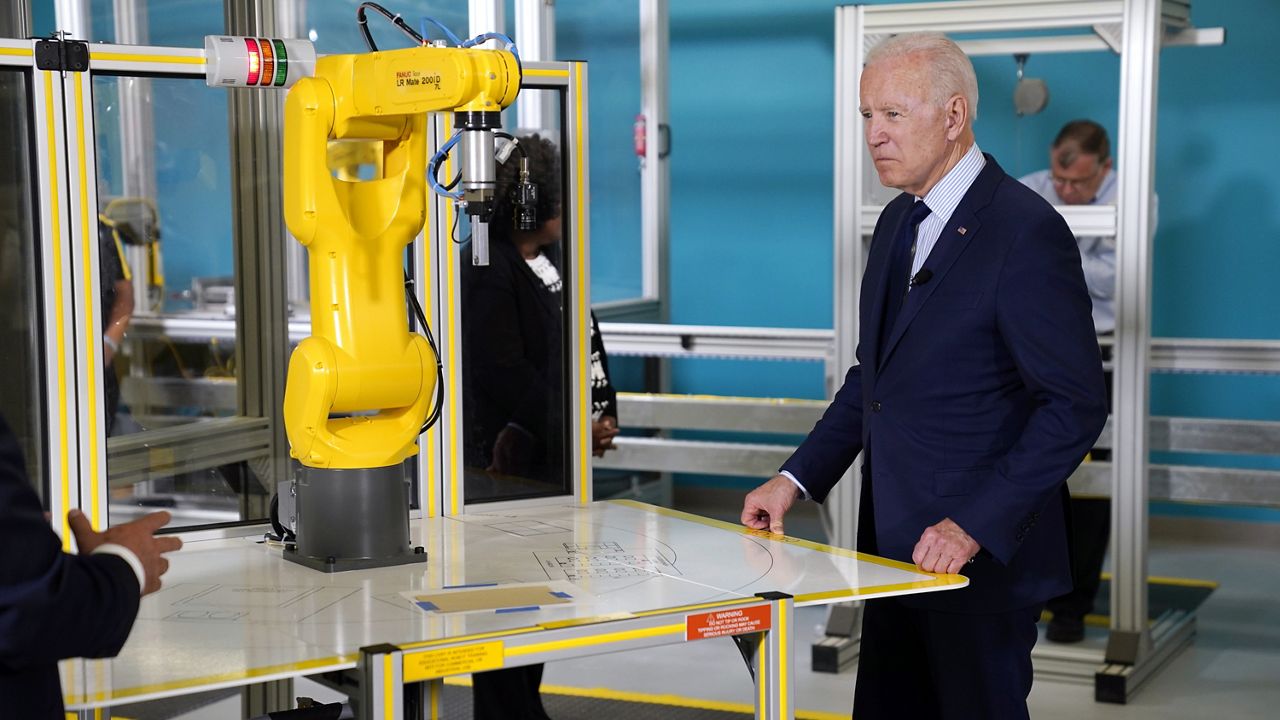The White House on Tuesday announced new initiatives to bolster the supply chains of four critical goods: Semiconductor manufacturing and advanced packaging, large capacity batteries, critical minerals and materials and both pharmaceuticals and active pharmaceutical ingredients.
The announcement comes after President Joe Biden ordered a 100-day review to identify disruptions and weaknesses in the manufacturing process for the goods in late February. The White House said Tuesday that weaknesses to domestic and international supply chains "threaten America’s economic and national security."
"While amplified by the public health and economic crisis, decades of underinvestment and public policy choices led to fragile supply chains across a range of sectors and products," the White House said in a statement.
"Unfair trade practices by competitor nations and private sector and public policy prioritization of low-cost labor, just-in-time production, consolidation, and private sector focus on short-term returns over long-term investment have hollowed out the U.S. industrial base, siphoned innovation from the United States and stifled wage and productivity growth," the White House added.
As for the pharmaceutical industry, the Department of Health and Human Services (HHS) will be tasked with creating a public-private partnership to ensure that essential medicines are produced domestically, instead of offshoring production to other countries.
The group’s first directive will be to identify 50-100 of these critical drugs from the Food and Drug Administration’s (FDA) essential medicines list to be prioritized for the so-called “onshoring” effort.
The FDA generally defines such medicines as “those that are most needed for patients in U.S. acute care medical facilities, which specialize in short-term treatment for severe injuries or illnesses, and urgent medical conditions.” Some of the more commonly-known drugs on the list include heparin, which is used to treat blood clots, azithromycin, an antimicrobial used to treat serious infections, and the popular pain reliever ibuprofen.
HHS will make an “initial commitment” of nearly $60 million, appropriated via the Defense Production Act from the American Rescue Plan, to develop greater domestic manufacturing capacity for the pharmaceutical products.
The supply chain for advanced large-capacity batteries, such as those used in electric vehicles, will also be getting a revamp under President Biden’s plan. The Department of Energy will announce a 10-year plan to “urgently develop a domestic lithium battery supply chain that combats the climate crisis by creating good-paying, clean energy jobs across America,” per the White House.
The Energy Department is set to host a “Battery Roundtable” to discuss the blueprint with key players in the battery supply chain later this month.
Electric vehicles are a key component to the future Biden envisions for the United States, and the president has previously emphasized the role such vehicles will play in tackling climate change and creating jobs.
"The future of the auto industry is electric. There's no turning back," Biden said during a May visit to the Ford Rouge Electric Vehicle Center in Michigan. "The real question is whether we'll lead or we'll fall behind in the race for the future, or whether we will build these vehicles and the batteries that go in them here in the United States or rely on other countries.”
The White House will also “invest in sustainable domestic and international production and processing of critical minerals” through a collaboration between federal agencies, the private sector, local governments, Tribal Nations and stakeholders in order to identify potential locations for such minerals to be extracted, all while adhering to strict environmental standards.
Biden’s primary goal with the various supply chain overhauls is to create more domestic manufacturing jobs, although the White House has declined to say how many jobs could be created, only that the benefits would extend past factory work.
The Biden administration will also create a Supply Chain Disruptions Task Force, which the White House says will "provide a whole-of-government response to address near-term supply chain challenges to the economic recovery."
The task force will be led by the Secretaries of Commerce, Transportation and Agriculture and will "focus on areas where a mismatch between supply and demand has been evident: homebuilding and construction, semiconductors, transportation, and agriculture and food."
The federal government announced a series of other initiatives stemming from the review, which are listed here.
Over the past year, the fragility of vital supply chains has been revealed repeatedly. The coronavirus outbreak led to an initial shortage of masks, gloves and other protective medical equipment. Automakers in the United States and Europe are now dealing with a shortage of computer chips.
The review found a sharp decline in domestic production of semiconductors in the U.S., and that the country “also lacks production capability at the most advanced technology levels.” The White House stressed the need to create a robust and resilient domestic supply chain for semiconductors in order to ensure “long-term economic competitiveness.”
Still, the White House does plan to lean on longstanding international allies in key areas -- most notably to “address semiconductor shortages,” particularly alongside Japan and the Republic of Korea.
The Associated Press contributed to this report.



